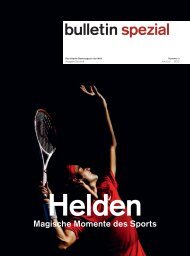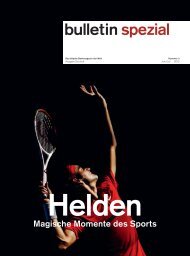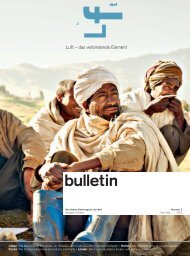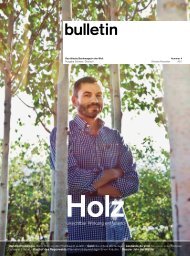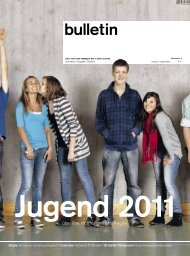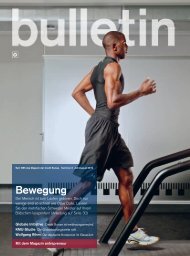Healthcare
Entering the digital era Global Investor, 02/2012 Credit Suisse
Entering the digital era
Global Investor, 02/2012
Credit Suisse
- No tags were found...
You also want an ePaper? Increase the reach of your titles
YUMPU automatically turns print PDFs into web optimized ePapers that Google loves.
GLOBAL INVESTOR 2.12 — 21<br />
Photos: Thomas Eugster | Cédric Widmer<br />
we model physiological interactions and<br />
<br />
mental<br />
components of the organism.<br />
What will the virtual patient look like?<br />
Denis Hochstrasser: There are<br />
<br />
USA, uses personal health<br />
information to visualize three-dimensional,<br />
interactive anatomical models of individuals<br />
that run on the iPad or iPhone. Nhumi,<br />
a spin-off of IBMware<br />
plug-ins for displaying virtual human<br />
<br />
physical exercise and having your avatar<br />
<br />
your medical history and genomic makeup.<br />
The virtual patient is actually part of<br />
a larger project called ITFoM (Information<br />
Tech nology Future of Medicine) that is<br />
competing for funding from the European<br />
<br />
<br />
Hans Lehrach: In Europe, we spend<br />
around 11% of GDP on medical treatment.<br />
<br />
of aging societies. Moreover, people<br />
<br />
at the same time they stopped working<br />
under Bismarck. And as we are finding out,<br />
longer living does not necessarily translate<br />
into healthier living. We have a very strong<br />
economic incentive to try and change<br />
the healthcare system.<br />
It’s going to take an enormous amount<br />
of computing power, isn’t it?<br />
Hans Lehrach:<br />
<br />
of a weather report for 500 million Europeans.<br />
We know that, for every patient coming<br />
<br />
tion<br />
of the capacity of a nuclear reactor.<br />
It comes down to how much extra information<br />
and computing power will save you<br />
how much on the medical side.<br />
What do the skeptics say?<br />
Denis Hochstrasser: They say, with<br />
some reason, that the greatest advance in<br />
modern medicine was hand washing. Losing<br />
<br />
would cutting down on alcohol and giving up<br />
smoking. Not ITFoM. But the two are not<br />
mutually exclusive. People do not see themselves<br />
as they are. With a medical avatar that<br />
evolves as a person gets older, they might.<br />
Hans Lehrach: We are currently<br />
<br />
per year, generating many more data than<br />
Hans Lehrach <br />
<br />
<br />
<br />
we did in the entire ten years of the genome<br />
project. In my view, that information<br />
<br />
than the 28% we have in clinical practice.<br />
<br />
cine<br />
now. It’s clear that our models initially<br />
<br />
<br />
<br />
expect from ITFoM?<br />
Hans Lehrach:<br />
tualize drug development. For example,<br />
pharma companies could take drugs<br />
that have failed in clinical trials and get<br />
<br />
patients that actually respond to them.<br />
That would not just save costs and reduce<br />
risks. It would also save time. Look, a drug<br />
patent lasts 20 years. If you can cut the<br />
time to development, which typically is 19<br />
years, to 6 using this type of virtualization,<br />
<br />
<br />
<br />
What does ITFoM mean for ordinary<br />
humans?<br />
Hans Lehrach: If you give people a<br />
computer model of themselves that allows<br />
them to test what will happen if they don’t<br />
jog regularly and watch their diet, that’s<br />
relevant to them. Empowering people to<br />
have more control over themselves is a positive<br />
development and potentially more<br />
far-reaching than making classical medicine<br />
more efficient.<br />
<br />
example of you doing rounds at the hospital,<br />
<br />
Denis Hochstrasser: Instead of me waiting<br />
for the computer to download PDF files,<br />
it shows me an image of the patient and<br />
-<br />
<br />
a toe infection. I go to each of these alerts,<br />
<br />
<br />
the proper therapies with confidence<br />
<br />
edge<br />
and all the knowledge we have<br />
-<br />
<br />
<br />
<br />
<br />
Sounds useful.<br />
Denis Hochstrasser:




